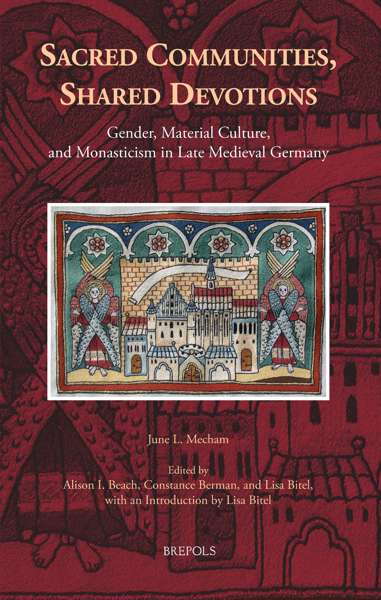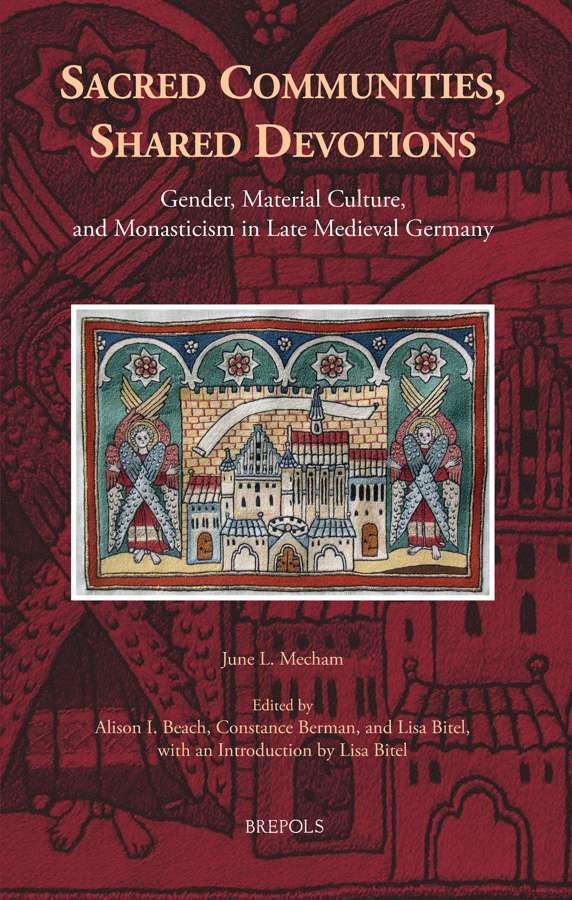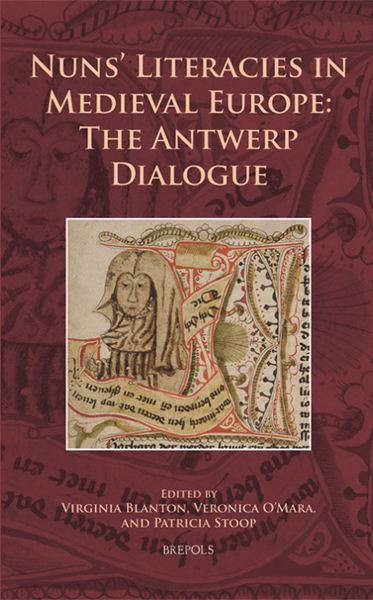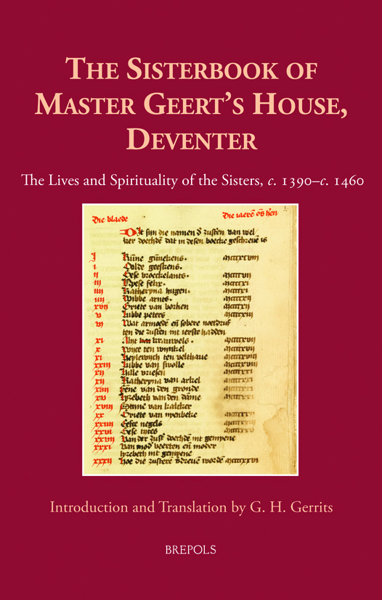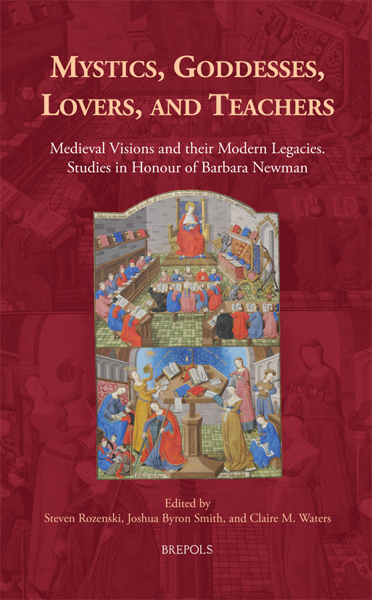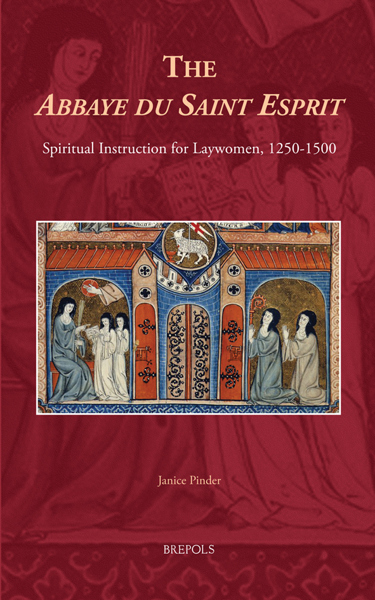
Sacred Communities, Shared Devotions
Gender, Material Culture, and Monasticism in Late Medieval Germany
June L. Mecham
(auth)
Alison Beach, Constance Berman, Lisa Bitel (eds)
- Pages: xviii + 310 p.
- Size:156 x 234 mm
- Illustrations:49 b/w, 2 tables b/w.
- Language(s):English, German, Latin
- Publication Year:2014
- € 100,00 EXCL. VAT RETAIL PRICE
- ISBN: 978-2-503-54134-1
- Hardback
- Available
- € 100,00 EXCL. VAT RETAIL PRICE
- ISBN: 978-2-503-56276-6
- E-book
- Available
Sacred Communities, Shared Devotions takes us behind the gates of six medieval Saxon convents, and into the lives of rich and noble nuns.
"La mise en évidence de conceptions et de pratiques religieuses spécifiquement féminines constitue indubitablement le point fort de cette recherche. (...) Sur le plan méthodologique, enfin, ce travail représente un modèle à suivre pour la construction d'une analyse historique à partir d'une combinaison de sources écrites et d'œuvres d'art." (Ghislain Baury, dans: Revue d'Histoire Ecclésiastique, 2015-1, p. 390-392)
"The posthumous publication of June Mecham’s study of women’s monastic culture in late medieval Germany serves as a testament to her meticulous data gathering and her interpretive clarity. (...) Throughout the study, Mecham constructs meaning from careful attention to seemingly mundane monastic objects, reminding us as scholars that sympathetic readings can indeed be transformative ones." (Cynthia J. Cyrus, in: Renaissance Quarterly, 68.3, 2015, p. 1045-1046)
"Gewinnbringend und zukunftsweisend ist (...) die Einbindung der materiellen Quellen aus den Frauenkonventen in die Untersuchung der mittelalterlichen (Para)Liturgie, Frömmigkeit und Anbetungspraxis sowie die Verknüpfung mit Fragen der Gender Studies. Es ist den Herausgeberinnen zu danken, dass sie die Arbeit von Mecham veröffentlich haben: So können ihre teils innovativen Forschungsergebnisse und ansätze sowie die umfangreiche Quellenschau weiter diskutiert werden. " (Julia Bruch, in: Francia-Recensio, 2015/3)
"Rather than simply following the well-trodden paths of past scholarship, Mecham explores a wide range of source material traditionally belonging to different disciplines in an attempt to find new answers. (...) this reviewer must express appreciation that the author and editors succeeded in transforming a weighty and detailed elaboration into a nuanced and very readable book. (...) Although, sadly, Mecham is no longer among us, the words she here contributes to the discourses on women’s monasticism live on. In closing, she challenges those who continue to study nuns to determine whether her findings reflect anomalies or conventions." (Corine Schleif, in: The Catholic Historical Review, autumn 2015, p. 919-21)
"Dans cette étude très fine et très détaillée, June L. Mecham excelle à montrer les interactions entre les pratiques religieuses, les positionnements de genre et les comportements sociaux. (...) Emportée par un cancer foudroyant, elle nous a laissé ce livre solide, original et stimulant publié par Lisa M. Bitel, sa directrice de thèse, et deux collègues." (Gérald Chaix, in: Revue Mabillon, n.s. 26, 2015, p. 386)
“Mecham offers an original study” (Hedwig Röckelein, in German Historical Institute London Bulletin, Vol. XXXVIII, No. 1 (May 2016), 48)
"Für die weitere Diskussion zum unerschöpflichen Thema der Frauenklöster hat die Autorin einen Meilenstein gesetzt." (Gia Toussaint, in: Das Mittelalter, 21(1), 2016, p. 223-224)
"Mechams Studie gibt insgesamt einen zugleich breiten und exemplarisch vertieften Einblick in die Zusammenhänge von Wirtschaft, Frömmigkeit und Kultur der Heideklöster des 14. und 15. Jahrhunderts, illustriert durch zahlreiche schwarzweiße Abbildungen, und bietet eine differenzierte Sicht auf die Reformen und ihre Auswirkungen." (Tanja Mattern, in: Zeitschrift für Historische Forschung, 43, 3 [2016], p. 542-544)
“June Mecham’s volume provides a multifaceted study of monastic life and its artistic manifestations (…) It offers a rich and nuanced examination of the art produced in six convents in the region in the years before the Reformation (…) Carefully researched, with valuable notes and an extensive bibliography, the volume contains a wealth of ideas worthy of additional study” (Debra L. Stoudt, in Mediaevistik, 29, 2016, p. 527-529)
Dr. June L. Mecham received her Ph.D. in History from the University of Kansas in 2004. Her research interests included women's history and gender history, especially female spirituality and monasticism, as well as the interaction between material culture and devotional practices, space and performance in late medieval Germany.
Selected for the 2008/09 Arts and Sciences Alumni Outstanding Teaching Award, she was also the recipient of an A.W. Mellon Posdoctorate Fellowship in Medieval studies spent at the Medieval Institute of Notre dame in 2006/07, and received the Neil Ker Memorial Fund Grant in 2007.
She passed away March 1, 2009, after a long illness, at the age of 35.
Sacred Communities, Shared Devotions takes us behind the gates of six medieval convents in Lower Saxony and into the lives of rich and noble nuns going about their daily labour of religion just before the Lutheran Reformation. Drawing on writings by and about the nuns, as well as an analysis of the costly art and architecture of their monasteries, June Mecham reveals how monastic women wielded their wealth to create a ritual environment dense with Christian images and meanings. Mecham argues that nuns chose devotions and rituals within the framework of a distinct material culture, influenced by local religious customs, gender structures, and social protocols. She questions perceived differences between monastic and lay piety, emphasizing instead the shared religious culture in which monastic and laywomen actively participated, and the continuity that shaped female devotion. Looking through lenses of art, history, and spirituality, Mecham describes the spiritual and social tensions caused by women who vowed poverty but lived a seemingly lavish life funded by private income. Medieval reformers, as well as modern scholars, suggested that profligate nuns hastened the decline of medieval convents, but Sacred Communities, Shared Devotions proves that these women did not oppose reform. They simply fought to maintain their traditional devotions and religious environments even as they adapted to new religious sensibilities.
Illustrations
Acknowledgements
A Note about June L. Mecham
Chapter 1. The Heath Convents of Lower Saxony
Chapter 2. In Festo Paschali: Performative Devotion and Liturgical Ritual
Chapter 3. The Art of Devotion
Chapter 4. Wealth and Poverty, Piety and Necessity
Chapter 5. Abbess Katharina von Hoya and the Creation of Monastic Space
Chapter 6. The Art of Reform
Chapter 7. Walking in the Footsteps of Christ
Epilogue
Note on Coinage
Bibliography
Index
